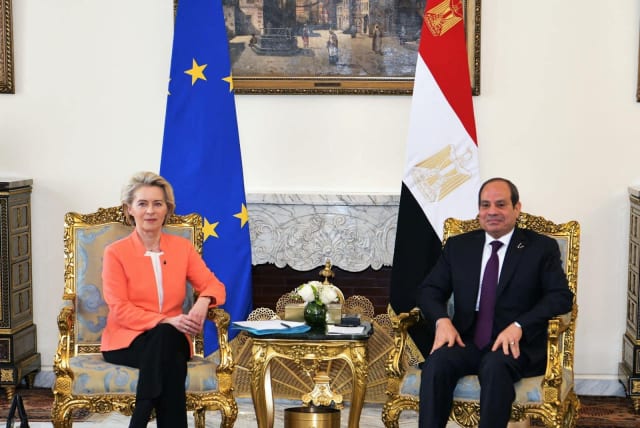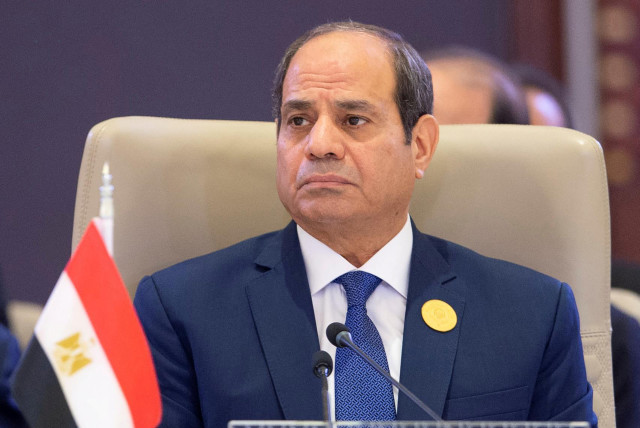EU and Egypt forge $8.1 billion deal to tackle migration and boost partnership

The EU announced a $8.1 billion deal with Egypt to enhance partnership and address migrant flows, but some critics argue it prioritizes countering migration over human rights
The European Union unveiled a funding package totaling $8.1 billion alongside an enhanced partnership with Egypt on Sunday during a visit of EU delegates to Cairo, part of efforts to address Africa's migrant flows toward Europe.
The agreement upgrades Egypt's ties with the EU to a"strategic partnership," which is expected to boost cooperation in energy, trade, and security over the next three years in return for Egypt to fortify its borders to prevent migration to Europe.
Kelly Petillo, program manager of Middle East and North Africa at the European Council on Foreign Relations, told The Media Line that Africa is a major priority for the EU, especially in terms of migration.
She noted that the idea to support North African governments with economic aid to curb migration was tested in Turkey first in 2016, and since then, it has been adapted to North Africa with a similar deal with Tunisia's government and now with Egypt. However, she stresses that this strategy has not proved to be successful.
A strategy that has not been successful
"The big problem is that the imperative to counter migration has come at the expense of advancing a rights-based agenda as part of the EU's cooperation with these countries," Petillo said, adding that the narrowing of the focus has allowed authoritarian governments in these countries to thrive. "Now leaders like al-Sisi and Saied feel more confident that they will be given leeway to cement their power and use financial support to do the bare minimum to sustain people in these countries.”
Jack Kennedy, associate director and head of Middle East and North Africa Country Risk at S&P Global Market Intelligence told The Media Line that, while Egypt is not the biggest single embarkation point for migration into Europe, it is a major transit country.
Kennedy said that the EU financial support likely represents Europe's recognition of several factors, including the country's population size. That is why, he says, the EU is "providing a level of support and preventing a wider economic collapse that could potentially drive significantly higher levels of migration, either from Egypt or third countries."
Additionally, the Egyptian economy is under significant strain from external events. Kennedy explained that the North African country is taking in high numbers of Sudanese refugees as a result of the fighting there, as well as Syrian refugees, and the potential for more Gazan refugees exists as well.
He pointed out that Egypt is also economically suffering, as its dollar revenues have been reduced due to the Houthi disruption of maritime traffic in the Red Sea and Suez Canal.
Petillo, meanwhile, said that Egypt represents a possible source of migrants due to the current situation. "The country hosts millions of refugees and risks becoming overwhelmed given numbers amidst a dire economic situation.”
She also noted that migrant arrivals from the Mediterranean have increased by 50% compared to last year, and dealing with the issue is a major priority for this summer's European elections.
Kennedy echoed this sentiment and agreed that the elections could have been a catalyst for closing this deal. "The EU leadership is likely mindful of trying to be seen to reduce irregular migrant flows into its member states ahead of elections these European Parliament elections in June and a need to outmaneuver far-right parties," he said.
He explained that the deal with Egypt consists of a three-year strategic partnership focused on soft loans intended to support economic reforms. He added that while the joint declaration on aid does refer to using funds to stop migration, it also states additional goals.
"It is likely that the bulk of funding over the period it is delivered will be used to support wider macroeconomic stability and invest in key strategic areas for the EU: energy, water, and food security," Kennedy said.
Petillo explained that the energy cooperation stems from Europe’s concern about its overreliance on Russian gas following the war in Ukraine and its need to reduce this for its partners.
She noted that the agreement also covers security, border protection, and counterterrorism measures. However, she continued, "It is unsure to what extent the deal can stop these migration routes from being used."
"It is hard to see how it can address core European concerns when conflicts are growing everywhere in Egypt, and instability looms large.”
Petillo believes that Egypt will struggle to do that without a concerted effort, along with European partners, to address governance and human rights in Egypt and surrounding countries. "It is right to help the country’s economy,” she said, “but until freedoms are also curtailed and instability all across the region becomes worse and worse, people will continue fleeing.”
Jerusalem Post Store
`; document.getElementById("linkPremium").innerHTML = cont; var divWithLink = document.getElementById("premium-link"); if (divWithLink !== null && divWithLink !== 'undefined') { divWithLink.style.border = "solid 1px #cb0f3e"; divWithLink.style.textAlign = "center"; divWithLink.style.marginBottom = "15px"; divWithLink.style.marginTop = "15px"; divWithLink.style.width = "100%"; divWithLink.style.backgroundColor = "#122952"; divWithLink.style.color = "#ffffff"; divWithLink.style.lineHeight = "1.5"; } } (function (v, i) { });

